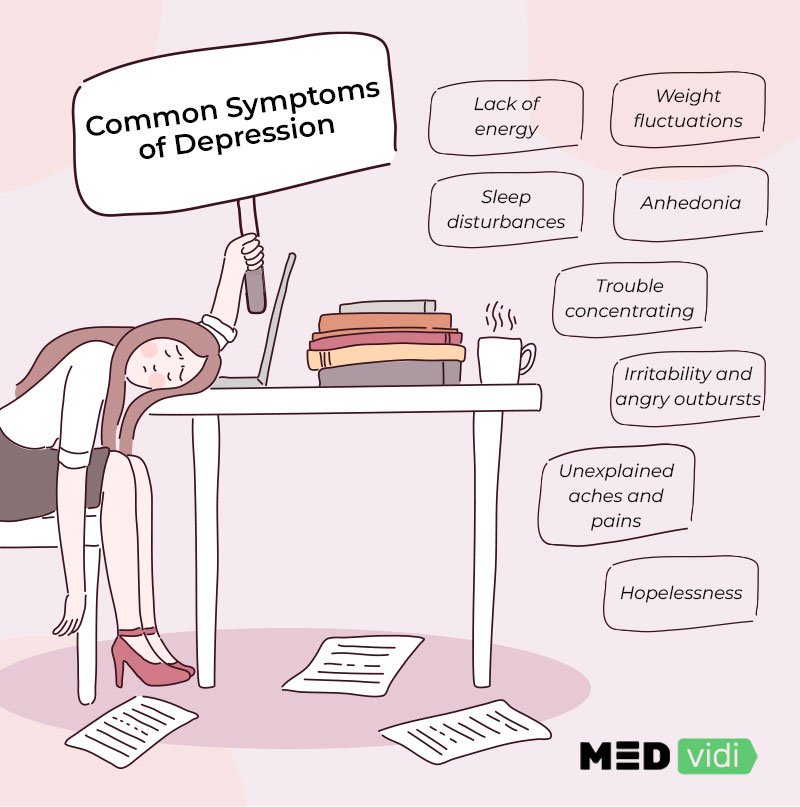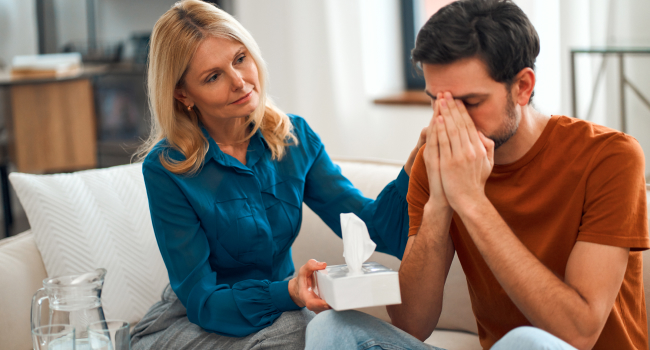Clinical depression or major depressive disorder affects
Since depression can be caused by various factors, it can happen to literally anyone. Most people consider seeing a mental health professional because of persistent feelings of loss of interest and sadness. Although these are the most common signs, there are many other clinical depression symptoms one should pay attention to.
Depression can be treated: see a doctor for depression online once you notice disturbing symptoms.
Symptoms of Major Depressive Disorder
Feeling Hopeless
It’s one of the most prevalent major depressive disorder symptoms, influencing how the person feels about life. The affected person has a negative outlook and feels powerless to stop or cope with unpleasant events.
Hopelessness fosters feelings of self-hate, guilt, worthlessness, and numbness, so it’s not uncommon for patients to contemplate suicide.
Appetite and Weight Change
One of the more obvious physical symptoms of depression is a change in weight and appetite. Someone with depression will eat too much or too little. They often turn to comfort food, trying to get positive emotions, while others lose their appetite because of low mood.
Over an extended period, this results in either weight gain or loss, affecting energy levels and mood. In some cases, the increased body fat leads to
Increased Fatigue
As pointed out, some people eat little, lowering their energy levels. That makes them feel tired, even with little exertion. Depression will also directly reduce someone’s energy and is the
It causes fatigue because depression affects people physically, emotionally, and socially. One-third of patients with depression remission suffer from bouts of fatigue.
Loss of Interest in Activities
Someone suffering from depression will not feel pleasure in conducting activities they previously enjoyed (anhedonia). The loss of enjoyment and motivation can lead to withdrawal, making the person feel numb when faced with undertakings they once looked forward to. That can also lead to a lowered sex drive, even impotence.
Poor Sleep
Another symptom of depression is a change in sleeping habits, as the person struggling with depression faces sleepless nights because of mood swings.
If anything, there’s a strong correlation between depression and sleep. Depression will make it difficult for someone to fall or stay asleep, while chronic lack of sleep causes neurochemical changes to the brain, leading to depression. The disorder also causes patients to wake up too early, causing sleep deprivation.
On the other hand, too much sleep can also be a sign that someone is suffering from depression.
Sleep disturbances can also indicate insomnia, See a doctor today to get a legit diagnosis.
Anxiety
Closely related to depression, anxiety may occur in people who don’t get adequate, restful sleep. Anxiety and depression are tied to the hip as they share common symptoms, such as fatigue, sleep difficulty, and headaches.
Mood Swings
One suffering from depression may find it difficult to control emotions, which leads to mood swings. The rapid fluctuation in emotions may cause them to have an angry outburst and break into tears in quick succession.

Substance Abuse
Speaking of mood swings, some people suffering from major depression symptoms resort to using drugs and alcohol to drown their sorrows, loneliness, and hopelessness.
According to the Anxiety & Depression Association of America, about
Irritability
The symptoms of depression can influence your life in different spheres: work, relationships, self-esteem, and more.
Lose Concentration or Memory
A patient showing signs of depression may sometimes lose focus as they have no incentive to believe something is worth achieving. They don’t see the point in trying to attain a specific goal. It may cause them to lose their train of thought because
Health Disorders and Physical Pain
Depression can cause physical pain and other health disorders. People with depression typically display common physical diseases such as headaches, digestive issues, and back pain.
That’s because the same neurotransmitters, norepinephrine, and serotonin, are responsible for regulating mood and pain. That makes it challenging to diagnose depressed patients as they typically only complain about the physical symptoms.
Recurrent Suicidal Ideation
Thinking about death is by far the most alarming sign associated with depression. According to research, people with depression have about a
Final Word
Depression affects someone’s ability to function normally. Symptoms of major depressive disorder are similar to most other cognitive disorders, so it can be challenging to make a diagnosis. The most common symptoms of depression include anxiety, fatigue, irritability, mood swings, feelings of hopelessness, loss of interest in activities, and weight loss or gain.
While mild depression can be managed with therapy and lifestyle changes, you would need medication for moderate to severe depression that persists for a long. Treatment for recurrent episodes of depression involves visiting a medical clinic, going through a test, and getting a prescription. Start with a free symptoms check at MEDvidi and see a doctor online if your mental state disturbs you.











